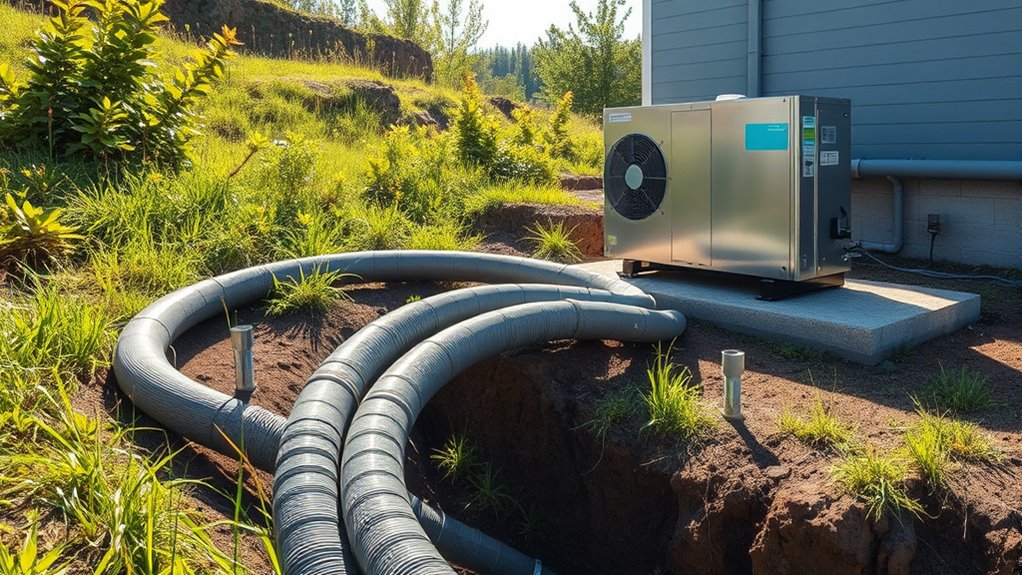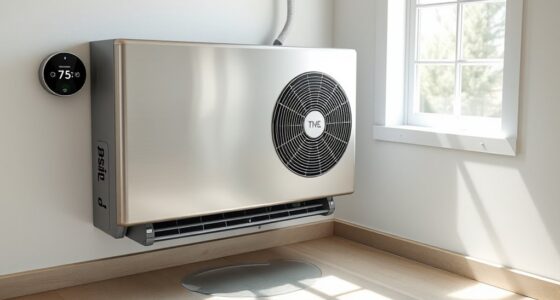Ground source heat pump technology uses the stable temperature of the earth to heat and cool your home efficiently. It works by circulating a fluid through underground loops that absorb heat in winter and release it in summer. This system offers reliable, eco-friendly comfort while reducing energy bills and dependence on traditional HVAC. With ongoing advances, it becomes more affordable and easier to maintain. Continue exploring to discover how this innovative system can transform your home’s climate control.
Key Takeaways
- Geothermal heat pumps utilize the earth’s stable underground temperature for efficient heating and cooling.
- They consist of underground loop systems that transfer heat to or from the ground depending on the season.
- The technology offers high efficiency and reduces energy consumption compared to traditional HVAC systems.
- It provides long-term savings, minimal maintenance, and reliable operation for decades.
- Environmentally friendly, geothermal heat pumps significantly lower carbon footprints and support sustainable energy use.

Have you ever wondered how to heat and cool your home more efficiently? If so, exploring ground source heat pump technology might be just what you need. This innovative system taps into the constant temperature of the earth to provide heating in winter and cooling in summer, making it an excellent choice for boosting your home’s energy efficiency. Unlike traditional HVAC systems that rely on burning fossil fuels or electrical resistance, geothermal heat pumps use the stable ground temperature as a natural energy reservoir, reducing your reliance on grid power and lowering your energy bills. They are designed to extract heat from the ground during winter and transfer heat back into it during summer, maintaining a comfortable indoor climate year-round without excessive energy consumption.
The core of this technology lies in the ground source heat pump, which consists of a loop system buried underground. This loop contains a fluid that absorbs heat from the earth in winter or releases heat into the ground in summer. Because the earth’s temperature just a few feet below the surface remains relatively constant—usually between 45 and 75 degrees Fahrenheit depending on your location—the system can operate efficiently regardless of the season. This consistency allows the heat pump to achieve higher energy efficiency compared to air-source systems, which must contend with fluctuating outdoor temperatures. You’ll find that ground source systems use considerably less electricity, translating into lower utility bills and a smaller carbon footprint.
Additionally, advances in ground source heat pump technology continue to improve system performance and affordability, making them more accessible to homeowners seeking sustainable options. Installing a geothermal heat pump involves some upfront investment, but the long-term savings and environmental benefits make it worthwhile. Once installed, the system requires minimal maintenance and offers reliable operation for decades. The high efficiency of ground source systems means they can provide more heating or cooling output for every unit of electricity used, making them a smart choice for eco-conscious homeowners wanting to reduce energy consumption. additionally, these systems can be integrated with existing home heating infrastructure, further enhancing their appeal.
In essence, a ground source heat pump offers a sustainable, efficient way to keep your home comfortable year-round. It leverages the earth’s natural thermal properties to provide a reliable source of energy, drastically improving your home’s energy efficiency. If you’re looking for a way to cut costs, reduce your environmental impact, and enjoy consistent indoor comfort, investing in geothermal heat pump technology could be the perfect solution. With proper installation and regular maintenance, you’ll benefit from a system that’s not only energy-efficient but also environmentally friendly, helping you take a step toward a greener future.
Frequently Asked Questions
How Long Does a Geothermal Heat Pump System Typically Last?
A geothermal heat pump system typically lasts 20 to 25 years, but its system lifespan can extend beyond that with proper maintenance. Durability factors like high-quality installation, regular servicing, and the use of durable components influence its longevity. You should schedule routine check-ups to guarantee ideal performance and prevent early wear and tear, which helps maximize your system’s lifespan and ensures reliable heating and cooling for years to come.
Are There Any Environmental Impacts of Geothermal Heat Pump Installation?
When you install a geothermal heat pump, you minimize its environmental footprint because it uses renewable energy and produces low emissions. However, land use can be a concern, especially if you need extensive ground loops, which might disrupt local ecosystems. Overall, geothermal systems are environmentally friendly, but you should consider land impact and guarantee proper installation to reduce any negative effects on the environment.
What Is the Initial Cost Comparison With Traditional HVAC Systems?
You’ll find that the cost comparison between geothermal heat pumps and traditional HVAC systems shows higher installation expenses for geothermal systems upfront. While installation expenses are significant, you save on energy bills over time due to their efficiency. Although the initial investment is greater, many homeowners consider it worthwhile because of lower operating costs and environmental benefits. Ultimately, your decision depends on balancing the higher initial costs against long-term savings.
Can Geothermal Heat Pumps Be Used in Urban Areas?
Think of geothermal heat pumps as adaptable chameleons, blending into city life. Yes, they can be used in urban areas, demonstrating strong urban compatibility. While space requirements vary, compact models and vertical loop systems make installation feasible even in tight spaces. With creative planning, you can harness geothermal energy amidst city buildings, turning your urban environment into a sustainable oasis that cools and warms efficiently without disrupting the cityscape.
What Maintenance Is Required for Geothermal Heat Pump Systems?
You need to regularly check and replace filters to keep your geothermal heat pump running efficiently. To prevent corrosion, verify the system’s components are inspected and maintained, especially the heat exchanger and piping. Schedule annual professional inspections, which include checking for leaks, cleaning filters, and testing system performance. Proper maintenance helps extend your system’s lifespan and keeps it operating at peak efficiency, saving you energy and costs.
Conclusion
Now that you understand how geothermal heat pumps work, you’ll see their potential to cut your energy bills and reduce carbon emissions. Did you know that geothermal systems can be up to 45% more efficient than traditional HVAC? By choosing this eco-friendly technology, you’re making a smart investment in both your comfort and the planet. Embracing geothermal heat pumps could be a game-changer for sustainable living—are you ready to make the switch?









